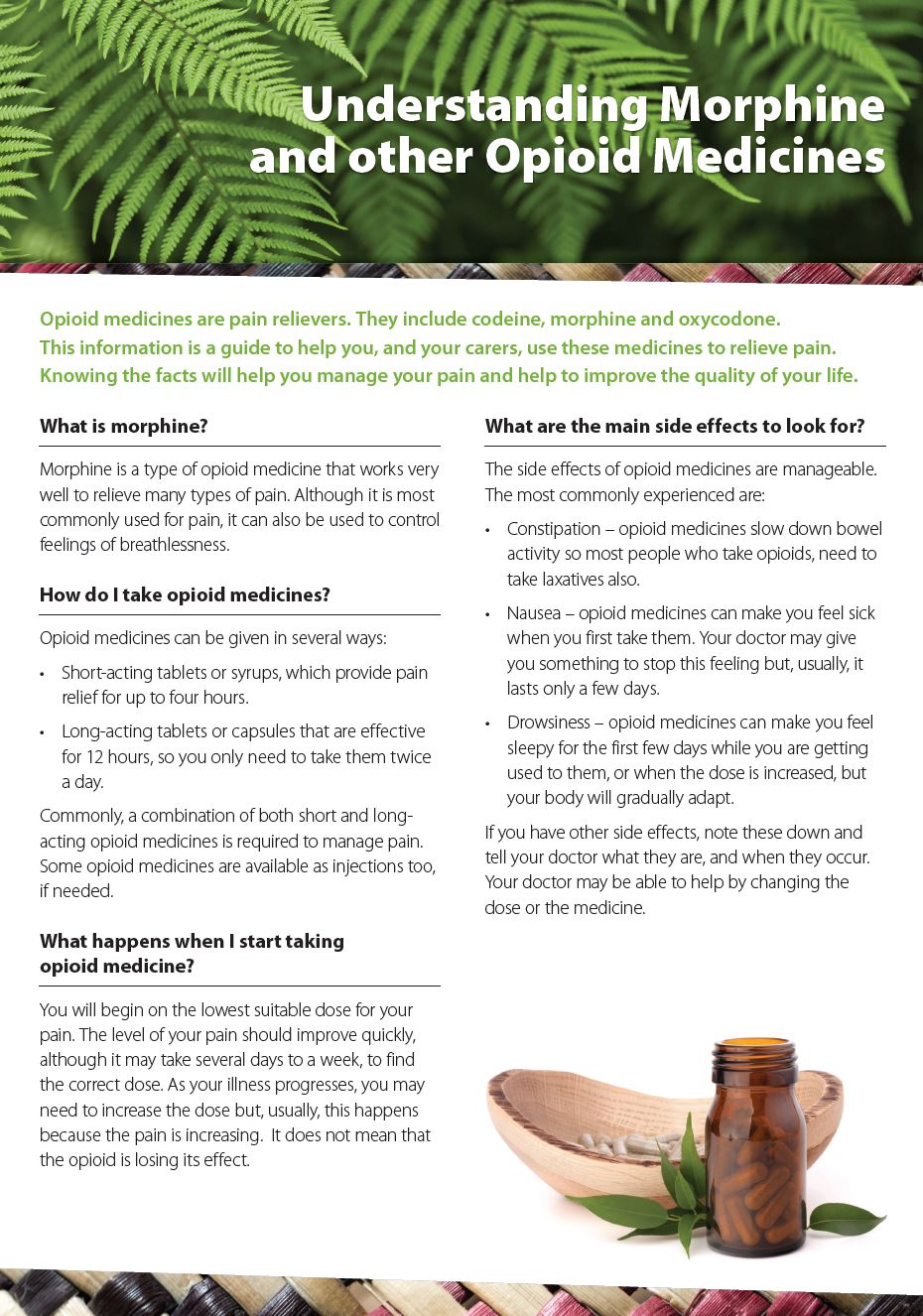Not everyone with a terminal illness has pain, but it is often people’s biggest fear and for some, it can be distressing. Pain can also impact your quality of life – it can wear you down, make you irritable, make it hard to sleep, reduce your appetite, and make it difficult to be active and enjoy life. Everyone experiences pain differently, so the way you experience pain will be unique to you.
Opioid painkillers such as morphine and oxycodone are often used to relieve moderate to severe pain in palliative care. They may be used with other pain relief medicines like paracetamol or NSAIDs (such as ibuprofen). Read more about pain relief medication.
In New Zealand, about 2 out of 3 of adults with terminal cancer will need an opioid. Opioids are also used for other terminal illnesses such as heart failure, kidney and liver disease, and neurodegenerative conditions. Read more about palliative care and managing common symptoms.
Low or no data? Visit zero.govt.nz, scroll down the page then click on our logo to return to our site and browse for free.
Opioids in palliative care
Key points about opioid medicines in palliative care
- Opioid medicines are pain relievers, which are often used to treat ongoing pain from cancer.
- They include medicines such as codeine, morphine and oxycodone.

Opioid painkillers are available on prescription only and must be prescribed by a doctor. The use of opioids in palliative care does not reduce time to death. Opioids are used to help relieve pain and improve your quality of life When choosing an opioid to manage your pain, your doctor may discuss the following things with you.
- Choice of opioid: morphine is the most commonly used opioid. Other opioids include oxycodone, fentanyl and methadone.
- Length of time before they start working: opioids are generally available as either short acting to relieve pain quickly, or slow release that you take once or twice a day to give stable pain relief throughout the day.
- Timing of your doses: it's important to take your opioid pain relievers at the times prescribed (or as close as possible to those times) to get the most benefit from them. For example, delaying an opioid medicine that takes time to start working may result in you experiencing pain that could have been avoided.
- Swallowing difficulties: if you are having trouble swallowing tablets or capsules, your doctor may prescribe a liquid or a patch. Remember, not all tablets can be crushed or split – ask your doctor or pharmacist to check. Read more about difficulty swallowing medicines.
- Breathing difficulties: appropriate doses of opioids should not cause breathing difficulties (also called respiratory depression).
- Addiction: to opioids is uncommon in people with pain caused by a terminal illness.
- Tolerance: opioids do become less effective over time because your body becomes used to the medicine. This is called ‘tolerance’. If your medicine is not working as well as it used to, tell your doctor so they can review your dose, or prescribe a different medicine, or choose a different form, or prescribe a combination of medicines.
- Pain control plan: your pain is unique to you. It's important to discuss your pain management options with your doctor and develop a plan on how to best manage your pain. Having pain doesn’t always mean that your pain plan is not working. It may mean that your medicines need to be reviewed. For examples of pain plans see My pain management plan(external link) NPS Medicinewise or Developing a plain control plan(external link) American Cancer Society.
The following links have more information on the use of opioids in palliative care. Be aware that websites from other countries may have information that differs from New Zealand recommendations.
Understanding morphine and other opioid medicine [PDF, 2.6 MB] Palliative Outcome Initiative, 2019
Use of strong opioids in palliative care(external link) NHS Trust, UK
Resources
Understanding morphine and other opioid medicines [PDF, 2.6 MB] Palliative Outcome Initiative English [PDF, 2.6 MB], Korean [PDF, 1.8 MB], Samoan [PDF, 1.4 MB], Simplified Chinese [PDF, 1.3 MB], Tongan [PDF, 1.2 MB]
Facts about morphine and other opioid medicines for pain in palliative care [PDF, 1.6 MB] Palliative Care Australia, 2021
5 questions to ask about your medications(external link) Health Quality and Safety Commission, NZ, 2019 English(external link), te reo Māori(external link)
References
Brochures

Palliative Outcome Initiative
EnglishKorean
Samoan
Simplified Chinese
Tongan

Palliative Care Australia, 2021
Credits: Sandra Ponen, Pharmacist, Healthify He Puna Waiora. Healthify is brought to you by Health Navigator Charitable Trust.
Reviewed by: Angela Lambie, Pharmacist, Auckland
Last reviewed:
Page last updated:






